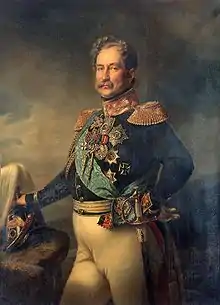Alexey Fyodorovich Orlov
Prince Alexey Fyodorovich Orlov (Russian: Алексе́й Фёдорович Орло́в; 30 October [O.S. 19 October] 1787 – 2 June [O.S. 21 May] 1862) was a Russian diplomat, the natural son of Count Fyodor Grigoryevich Orlov. Born in Moscow, he took part in the Napoleonic Wars from 1805 to the capture of Paris in 1814. For his services as commander of the cavalry regiment of the Horse Life Guards during the rebellion of 1825 he was granted the title of count, and in the Turkish War of 1828–1829 he rose to the rank of lieutenant-general.
Prince Alexey Fyodorovich Orlov | |
|---|---|
 | |
| Russia Ambassador to Constantinople | |
| Assumed office 1833 | |
At this time his diplomatic career began. He served as the Russian plenipotentiary at the Peace of Adrianople, and in 1833 was appointed Russian ambassador at Constantinople, holding at the same time the post of commander-in-chief of the Black Sea Fleet. He became, indeed, one of the most trusted agents of Emperor Nicholas I, whom in 1837 he accompanied on his foreign tour. From 1844 to 1856 Orlov headed the infamous Third Section (secret police).
In 1854 he travelled to Vienna to bring Austria over to the side of Russia during the Crimean War of 1853–1856, but without success. In 1856 he was one of the plenipotentiaries who concluded the Peace of Paris. In the same year, raised to the dignity of prince, he was appointed president of the Imperial Council of State and of the Council of Ministers. In 1857, during the absence of Emperor Alexander II, he presided over the commission formed to consider the question of the emancipation of the serfs, to which he was altogether hostile. He died in Saint Petersburg.
In popular culture
Orlov was the subject of a satirical verse by Alexander Pushkin, alleging that Orlov's mistress, the dancer Istomina, could see his penis only through a microscope.[1]
References
- Simon Sebag Montefiore, The Romanovs 1613–1918, Weidenfeld & Nicolson 2016, p 327
External links
- Bain, Robert Nisbet (1911). . Encyclopædia Britannica. Vol. 20 (11th ed.). p. 293; see para 5.
Alexis Fedorovich Orlov, Prince (1787-1862)